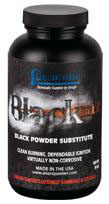|
Black MZ�Black Powder Substitute Range Tests  Black MZ was introduced at the 2011 National Association of Sporting Goods Wholesalers (NASGW) in Reno, Nevada in November 2011. As such, it was a bit late for most folks to consider hunting with it during the 2011 seasons. We received our supply of Black MZ shortly after the 2012 SHOT Show in Reno, Nevada and began testing as soon as we returned home. Most everyone who has read our articles knows that we have been pellet shooters for years. I think that is one reason the folks at Alliant wanted us to test out their powder. They wanted us to explore another option for hunting here in the west. Black MZ is a citric-based powder, as such; it is less hydroscopic and should be cleaner burning and less corrosive than most other black powder substitutes. With that in mind, we ran tests during our dry season with the humidity at 10% and during our monsoon season when the humidity reaches above 80%. We experienced no difference in ignition and cleanup was easy under all conditions. We used Thompson/Center�s Hunters Black Powder measure to determine volumetric values and then weighed each to calculate the grain equivalent by weight. Ten grains of Black MZ by volume equals 8.8 grains by weight. We weighed all charges to provide consistency in our tests. In case you are wondering, we burned over two pounds of powder over a six month period. For the velocity values, we fired five rounds with each bullet through our Chrony, throwing out the high and low numbers and averaging the three in the middle. The elevation of our shooting range is 5232 feet. With all that shooting, we managed not to shoot the Chrony. Jim, Mary and Jon Clary assisted in these tests. Jon is Doc�s son, who lives in New Zealand and was visiting home. He is an avid outdoorsman and shooter. With the Optima pistol, which has a 14" barrel, we used a Harris bipod as a rest. The air temperature was 75F and the humidity 10%. We shot three shot groups at 50 yards and four shot groups at 100 yards (with the first three loads only). CVA OPTIMA PISTOL TEST RESULTS
With the Accura rifle, which has a 27" barrel, we used an Excel front rest with rear bag for stability. The air temperature was 85F and the humidity 80%. We fired four shot groups at 100 yards for record. CVA ACCURA RIFLE TEST RESULTS
In the course of our accuracy and velocity testing with Black MZ, we found the velocities with each load were very consistent, with variances averaging less than 30 fps. For best results, make sure that you heavily compress the charge each time you load. We were able to fire successive rounds without swabbing the barrel and the bullets did not "climb," they remained on target. This is a major plus for hunters who want to be able to quickly load a second shot in the field. After our tests, we wanted to find out how many rounds we could fire before it became difficult to reload. We fired ten shots before it took more than the normal amount of pressure to seat the bullet. In fact, the fouling was most pronounced about four inches from the muzzle. Once past that, the bullets loaded easily. There was no crud ring forward of the breech plug, which is common in many other black powder substitutes. It was always easy to seat the bullet/sabot properly. The powder did not clump. It flowed smoothly in both low and high humidity. Gun clean-up was incredibly easy. We ran a bore brush down the muzzle to break loose the small amount of residue, followed up with a couple of moist patches and then some dry patches and we were done. Ok, we used more than a couple, but we are finicky about our guns. Seriously, cleaning after shooting Black MZ is as easy as cleaning a gun you have been firing with smokeless powder. Because of its easy cleanup and resistance to moisture, we suspect that Black MZ will become very popular with the SASS / Cowboy Action shooting crowd. In our opinion, Black MZ lived up to all of its advertising claims and is an excellent black powder substitute. However, it pays to be careful where you buy. Cabelas is selling it at $31.99 for a pound, claiming that their regular price is $34.99, while Grafs is getting the normal price of $21.99 for the same one pound container. |